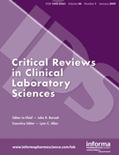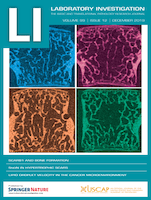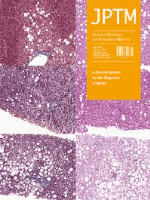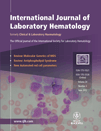
JOURNAL OF CLINICAL PATHOLOGY
Scope & Guideline
Empowering Pathologists with Cutting-edge Research
Introduction
Aims and Scopes
- Clinical and Diagnostic Pathology:
The journal emphasizes research that enhances diagnostic methodologies, including histopathology, cytopathology, and molecular diagnostics, aiming to improve the accuracy and utility of laboratory tests in clinical settings. - Molecular Pathology and Genetics:
There is a strong focus on the molecular aspects of pathology, including genetic testing, biomarker discovery, and the understanding of molecular alterations in various diseases, particularly cancers. - Laboratory Medicine and Quality Improvement:
Research on laboratory practices, quality assurance, and the implementation of new technologies in pathology laboratories is a significant aspect, aiming to enhance laboratory efficiency and diagnostic outcomes. - Transfusion Medicine and Hematopathology:
The journal covers studies related to transfusion practices, blood banking, and hematopathology, addressing both clinical and laboratory challenges in these areas. - Emerging Infectious Diseases and Public Health:
Research related to the pathology of infectious diseases, particularly those with public health implications, is a core area, especially in light of recent global health crises. - Artificial Intelligence and Digital Pathology:
The journal explores the integration of artificial intelligence and digital technologies in pathology to enhance diagnostic accuracy, workflow efficiency, and educational opportunities.
Trending and Emerging
- Integration of Artificial Intelligence:
There is a growing trend in utilizing artificial intelligence to enhance diagnostic processes, automate workflows, and improve the accuracy of pathology results, indicating its importance in future pathology practices. - Molecular Diagnostics and Personalized Medicine:
An increase in research focusing on molecular diagnostics, including genetic profiling and targeted therapies, reflects a shift towards personalized medicine in pathology, particularly in oncology. - Pathology Education and Training Innovations:
Emerging themes include innovative educational approaches for pathology training, such as virtual learning and competency-based assessments, which are crucial for developing future pathologists. - Public Health and Infectious Disease Research:
The journal is increasingly publishing studies related to public health concerns and infectious diseases, particularly in response to the COVID-19 pandemic, emphasizing the role of pathology in global health. - Quality Improvement Initiatives:
There is a notable trend towards research that focuses on quality improvement in laboratory practices, including reducing errors, enhancing patient safety, and optimizing test utilization.
Declining or Waning
- Traditional Cytology Techniques:
There has been a decreasing emphasis on traditional cytology methods, as advancements in molecular diagnostics and imaging techniques provide more accurate and efficient diagnostic options. - Basic Hematology Studies:
Research focusing solely on basic hematology without incorporating molecular or advanced imaging techniques has become less prominent, indicating a shift towards more integrated approaches. - Older Diagnostic Protocols:
The journal has seen fewer publications on outdated diagnostic protocols and methodologies that do not align with current best practices in pathology and laboratory medicine. - Non-Specific Infectious Disease Studies:
Research that lacks specificity or does not incorporate modern diagnostic techniques, such as molecular diagnostics, has decreased, reflecting a trend towards more targeted and precise studies.
Similar Journals

CRITICAL REVIEWS IN CLINICAL LABORATORY SCIENCES
Illuminating Pathways in Clinical Laboratory InnovationCRITICAL REVIEWS IN CLINICAL LABORATORY SCIENCES, published by Taylor & Francis Ltd, stands as a premier journal in the field of clinical laboratory science, addressing pivotal advancements and challenges since its inception in 1970. With a commendable impact factor derived from its ranking in Q1 categories across multiple disciplines—including Biochemistry, Genetics and Molecular Biology, and Clinical Biochemistry—this journal is a critical resource for researchers, clinicians, and educators aiming to deepen their understanding and application of laboratory science. The journal's rigorous peer-review process ensures that only the highest quality research is published, providing a platform for profound discussions that influence laboratory practices globally. Although not an open-access journal, it offers various subscription options to facilitate access to its wealth of knowledge. Operating out of Abingdon, England, CRITICAL REVIEWS IN CLINICAL LABORATORY SCIENCES continues to shape the future of clinical biochemistry and laboratory research through its insightful articles, systematic reviews, and expert commentaries, making it an essential read for professionals eager to stay at the forefront of their field.

HISTOPATHOLOGY
Unveiling the Complexities of Disease MechanismsHISTOPATHOLOGY is a premier scholarly journal published by WILEY, targeting the fields of histology, pathology, and forensic medicine. With an ISSN of 0309-0167 and an E-ISSN of 1365-2559, this esteemed journal has maintained a strong academic presence since its inception in 1977. Boasting an impressive Q1 ranking in crucial categories such as Histology and Pathology, it ranks 13th out of 208 in Pathology and Forensic Medicine, and 5th out of 62 in Histology, reflecting its high impact and relevance within the scientific community. HISTOPATHOLOGY serves as a critical platform for disseminating significant research findings, reviews, and advancements in the diagnostic and therapeutic aspects of pathology. Although it does not operate under an open access model, its rigorous peer-review process ensures that published articles uphold the highest standards of scientific integrity. Scholars and practitioners alike benefit from the insights shared in this journal, as it aims to bridge the gap between laboratory science and clinical practice, fostering innovation and enhancing our understanding of disease mechanisms.

Journal of Laboratory Physicians
Transforming laboratory practices with innovative research.The Journal of Laboratory Physicians is a prestigious, peer-reviewed publication dedicated to advancing the field of laboratory medicine. Published by THIEME MEDICAL PUBL INC, this journal has established itself as a vital source of research and clinical insights since its inception, transitioning to Open Access in 2009 to broaden its reach and accessibility. With an ISSN of 0974-2727 and an E-ISSN of 0974-7826, it aims to provide a platform for professionals, researchers, and students engaged in laboratory-based studies to share critical findings and foster collaboration across disciplines. The journal's scope encompasses a wide range of topics relevant to laboratory physicians, ensuring that it remains an essential resource for those seeking to stay on the cutting edge of laboratory practices and innovations. By disseminating timely research and reviews, the Journal of Laboratory Physicians plays a crucial role in enhancing the quality of healthcare through improved laboratory services.

LABORATORY INVESTIGATION
Transforming Laboratory Findings into Clinical SolutionsLaboratory Investigation is a premier academic journal published by Elsevier Science Inc, specializing in the fields of Pathology, Forensic Medicine, Cell Biology, and Molecular Biology. With its ISSN 0023-6837 and E-ISSN 1530-0307, this journal has been a significant contributor to scientific discourse since its inception in 1952, converging into its current form by 2024. It holds an impressive standing in its respective fields, featuring a 2023 Journal Rank of Q2 in both Cell Biology and Molecular Biology, and an elite Q1 ranking in Pathology and Forensic Medicine, reflecting its influence and quality of research, as seen in its Scopus ranks—17th out of 208 in Pathology and Forensic Medicine. Although it does not offer Open Access options, the journal remains a vital resource for researchers, professionals, and students who seek to disseminate and engage with high-caliber research findings. The importance of Laboratory Investigation is underscored by its commitment to advancing the understanding of laboratory and translational medicine, paving the way for innovations that enhance clinical practices.

Journal of Pathology and Translational Medicine
Fostering Collaboration in Pathology and HistologyThe Journal of Pathology and Translational Medicine, published by the Korean Society of Pathologists, is a distinguished peer-reviewed Open Access journal that has been at the forefront of advancing the field of pathology and histology since its inception in 1985. With an established ISSN of 2383-7837 and an E-ISSN of 2383-7845, the journal serves as a vital platform for disseminating high-quality research, fostering collaboration among professionals and offering valuable insights into both clinical applications and theoretical advancements. Recognized for its influence in the field, it holds a commendable Q2 ranking in both Histology and Pathology & Forensic Medicine categories in 2023, and ranks #52/208 in Scopus for Medicine – Pathology and Forensic Medicine, demonstrating its impact and reach within the academic community. Located in South Korea at 1209 Gwanghwamun Officia, 92 Saemunan-ro, Jongno-gu, Seoul 03186, this journal not only caters to researchers and professionals but also supports students striving to deepen their understanding of pathology. Join the growing body of knowledge and stay updated with the latest findings in this essential field of study through the journal's open access format, promoting worldwide accessibility and engagement.

Malaysian Journal of Pathology
Exploring the frontiers of disease mechanisms and diagnostics.Malaysian Journal of Pathology, published by the MALAYSIAN JOURNAL PATHOLOGY, stands as a pivotal resource in the fields of pathology and medicine, contributing rich insights since its inception in 1979. This peer-reviewed journal, based in Malaysia, is dedicated to disseminating original research, review articles, and case studies that advance the understanding of disease mechanisms and diagnostics. With a current impact factor reflecting its ranked positioning—Q4 in Cell Biology, Q4 in Histology, and Q3 in both Miscellaneous Medicine and Pathology & Forensic Medicine—this journal serves as an essential platform for researchers, clinicians, and students alike. Although it operates without open access, its scholarly rigor and contributions are well recognized, holding ranks such as #84 in Pathology and Forensic Medicine according to Scopus. The Malaysian Journal of Pathology is committed to fostering innovation and excellence in medical research, making it an invaluable tool for professionals seeking to stay abreast of significant advancements in the pathology domain.

Pathologia
Advancing the Frontiers of PathologyPathologia is a prominent open-access journal dedicated to advancing the field of clinical and experimental pathology, published by ZAPORIZHZHYA STATE MEDICAL UNIVERSITY. Established in 2013, the journal aims to provide a platform for researchers, clinicians, and students to share innovative research, case studies, and reviews that are critical to understanding disease mechanisms and improving diagnostic and therapeutic strategies. With a steady commitment to high-quality research dissemination and accessibility, this journal serves as an essential resource for those in the medical and health sciences fields. Researchers engaging with Pathologia can explore a diverse range of topics, including histopathology, molecular pathology, and laboratory medicine, promoting both scholarly discussion and practical applications. The journal's open-access model ensures that vital research findings are freely available to the global academic community, fostering a collaborative environment that is crucial for the advancement of pathology as a discipline.

International Journal of Laboratory Hematology
Pioneering insights in hematology for a healthier tomorrow.The International Journal of Laboratory Hematology, published by WILEY, serves as a vital resource in the field of hematology, delivering high-quality research findings and innovations within laboratory practices since its inception in 2007. This journal, accessible under Open Access options, showcases cutting-edge studies that span critical aspects of biochemistry and clinical laboratory methodologies. With a notable impact factor reflected in its Q2 and Q3 rankings across various categories—such as Biochemistry (medical) and Hematology—this journal stands out within the Scopus rankings, positioning itself within the 60th and 59th percentiles of its respective fields. Situated in the United Kingdom, the journal's objectives lie in disseminating pivotal research that enhances our understanding of hematological disorders and laboratory techniques, making it an essential tool for researchers, professionals, and students alike who are committed to advancing the science of laboratory hematology and its applications.

ANNALES DE BIOLOGIE CLINIQUE
Innovating Health Science through Rigorous ResearchANNALES DE BIOLOGIE CLINIQUE is a prominent French journal dedicated to advancing the fields of Biochemistry, Genetics, Molecular Biology, Immunology, and Microbiology. Published by JOHN LIBBEY EUROTEXT LTD, this journal has been a pivotal resource since its inception in 1945, offering a rich archive of original research, reviews, and clinical studies that aim to bridge the gap between laboratory findings and clinical applications. Despite its ranking in the Q4 quartile within several scientific categories according to the 2023 Scopus rankings—positioning it at #395/636 in General Medicine and #198/221 in General Biochemistry—ANNALES DE BIOLOGIE CLINIQUE serves as a vital platform for emerging researchers and seasoned professionals alike, fostering collaboration and innovation in these vital areas of health science. As an essential tool for researchers and scholars, the journal does not currently provide open access; however, it continuously strives to enhance its impact and visibility in the scientific community through rigorous peer-reviewed content and educational contributions.

SEMINARS IN DIAGNOSTIC PATHOLOGY
Leading the way in pathology innovation.Seminars in Diagnostic Pathology is a premier journal that has established itself as an essential resource in the field of pathology since its inception in 1984. Published by W B Saunders Co-Elsevier Inc, this journal boasts an impressive Q1 ranking in the pathology category for 2023, placing it in the top tier of medical journals worldwide. With a focus on diagnostic pathology, it offers a platform for groundbreaking research and advancements that bridge the gap between basic science and clinical practice. The journal is committed to publishing high-quality review articles, case reports, and expert opinions that provide valuable insights for professionals, researchers, and students alike. Although it operates on a subscription model, the journal's extensive impact is reflected in its Scopus rank (#56/208), with a remarkable 73rd percentile standing in the pathology and forensic medicine category. The journal's authoritative content not only aids in enhancing knowledge but also fosters an understanding of the evolving challenges and methodologies in diagnostic pathology, making it an indispensable tool for anyone dedicated to excellence in the field.